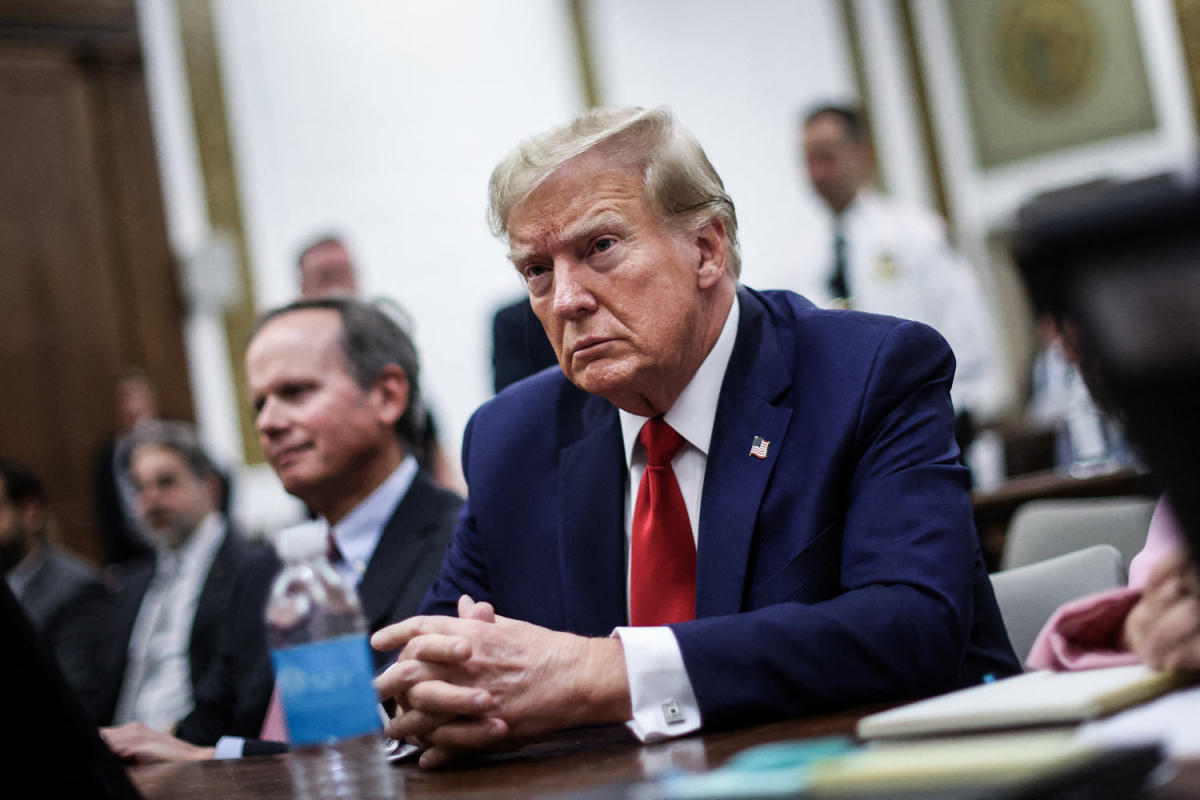WASHINGTON — A federal appeals court in Washington, D.C., on Friday upheld but narrowed the gag order that had been imposed on former President Donald Trump in his election interference case prohibiting him from making critical comments about potential witnesses and prosecutors.
“We agree with the district court that some aspects of Mr. Trump’s public statements pose a significant and imminent threat to the fair and orderly adjudication of the ongoing criminal proceeding, warranting a speech-constraining protective order,” the appeals court ruled. “The district court’s order, however, sweeps in more protected speech than is necessary. For that reason, we affirm the district court’s order in part and vacate it in part.”
The new version of the gag order bars Trump and his lawyers from making “public statements about known or reasonably foreseeable witnesses concerning their potential participation in the investigation or in this criminal proceeding,” but also allows him some leeway if a high-profile witness makes disparaging comments about him.
It also upheld the section of the order prohibiting Trump and his lawyers from making public statements about lawyers in the case, court staff, special counsel staff or their family members. The one exception is special counsel Jack Smith, who Trump continued to deride as a “thug” and “deranged” on social media after the appeals court stayed U.S. District Judge Tanya Chutkan’s gag order while it weighed his arguments. The appeals court found her order “should not have restricted speech about the Special Counsel himself.”
But the court also found that Trump “does not have an unlimited right to speak.”
“The record shows that Mr. Trump has repeatedly attacked those involved in this case through threatening public statements, as well as messaging daggered at likely witnesses and their testimony,” the ruling said. “The unique megaphone a defendant wields, amplified by social media, ramps up the risk of public and press reactions and attention capable of altering or swaying witnesses’ participation in the trial or the content of their testimony. The risk is particularly significant that public statements about certain witnesses’ involvement in the case may intimidate other potential witnesses from providing testimony, encourage them to alter their testimony, or dissuade them from cooperating with investigators.”
The court is not signing off on the order “lightly,” U.S. Circuit Judge Patricia Millett wrote for the three-judge panel. “Mr. Trump is a former President and current candidate for the presidency, and there is a strong public interest in what he has to say. But Mr. Trump is also an indicted criminal defendant, and he must stand trial in a courtroom under the same procedures that govern all other criminal defendants. That is what the rule of law means.”
In a statement on his social media platform Truth Social, Trump complained that the appeals court “largely upheld the Gag Order against me in the ridiculous J6 Case” and said “that I can be barred from talking and, in effect, telling the truth. In other words, people can speak violently and viciously against me, or attack me in any form, but I am not allowed to respond, in kind.” “We will appeal this decision,” Trump added.
Prosecutors from Smith’s office had argued the order was necessary because there’s a history of people who’ve been criticized by the former president getting harassed by his followers, including election workers in Georgia he’d wrongly accused of fraud during the 2020 election, other election officials who’d pushed back on his stolen election claims and even the law clerk of the judge in his ongoing civil fraud trial.
Trump had criticized some of the likely witnesses in the case before the gag order was handed down and then after it was stayed, including his former chief of staff Mark Meadows and Vice President Mike Pence.
The appeals court noted that Chutkan found in her gag order ruling that “’when Defendant has publicly attacked individuals, including on matters related to this case, those individuals are consequently threatened and harassed.’ Mr. Trump has not shown that factual finding to be clearly erroneous, and we hold that the record amply supports it.”
The court also appeared to be skeptical of one of Trump’s proposed solutions, to delay his trial until after the presidential election.
“Delaying the trial date until after the election, as Mr. Trump proposes, would be counterproductive, create perverse incentives, and unreasonably burden the judicial process,” the ruling said. “In addition, postponing trial would incentivize criminal defendants to engage in harmful speech as a means of delaying their prosecution.”
The appeals court had stayed Chutkan’s decision while it weighed Trump’s arguments. Their order ended that stay, meaning the revised version of the gag order is now in effect.
Trump has pleaded not guilty to charges of conspiring to defraud the United States in an effort to subvert the 2020 election results. The case is scheduled to go to trial in March.
An attorney for Trump did not immediately respond to a request for comment.
In a statement before Trump’s Truth Social posting, Steven Cheung, a spokesperson for his campaign, seemed to cast the ruling as a victory.
“Today, the D.C. Circuit Court panel, with each judge appointed by a Democrat President, determined that a huge part of Judge Chutkan’s extraordinarily overbroad gag order was unconstitutional. President Trump will continue to fight for the First Amendment rights of tens of millions of Americans to hear from the leading Presidential candidate at the height of his campaign,” the statement said.
The former president is also appealing a gag order that was imposed on him in the ongoing $250 million civil fraud trial the New York attorney general’s office brought against him and his company.
Judge Arthur Engoron barred Trump from mentioning his court staff after Trump smeared his law clerk on social media and then complained that she was “biased” against him. Court officials said Trump’s comments and messages led to a “deluge” of threats. Trump is arguing the ruling unfairly restricts his First Amendment right to free speech.
This article was originally published on NBCNews.com

Amanda Smith is a dedicated U.S. correspondent with a passion for uncovering the stories that shape the nation. With a background in political science, she provides in-depth analysis and insightful commentary on domestic affairs, ensuring readers are well-informed about the latest developments across the United States.





